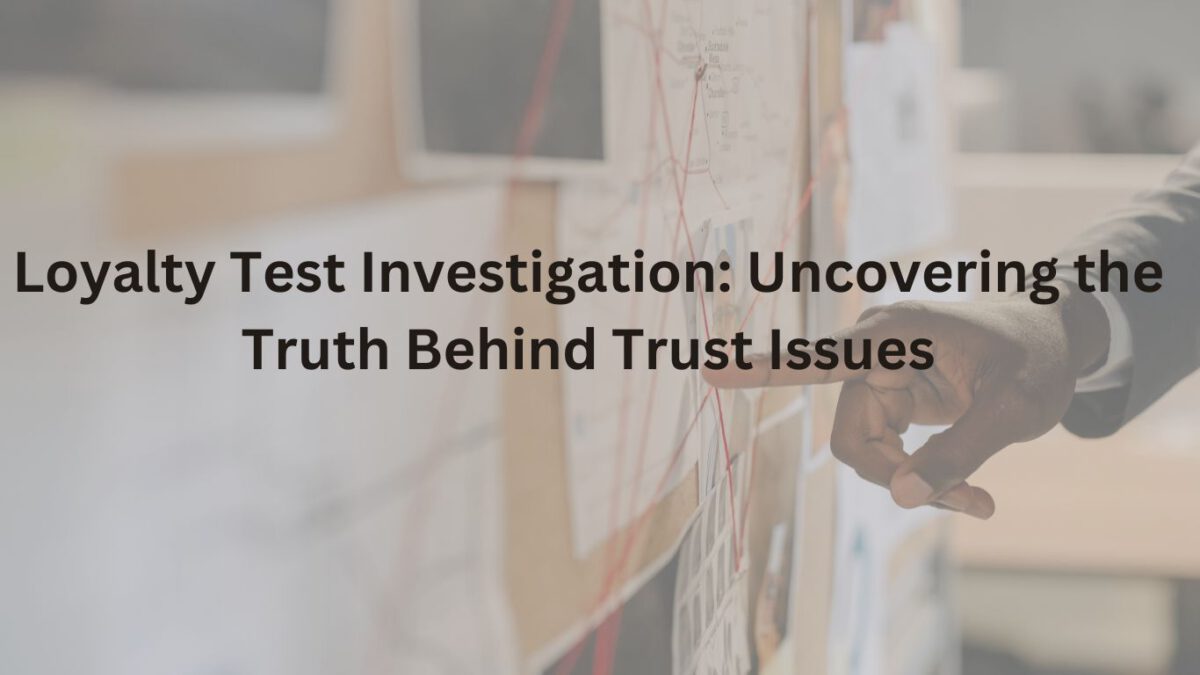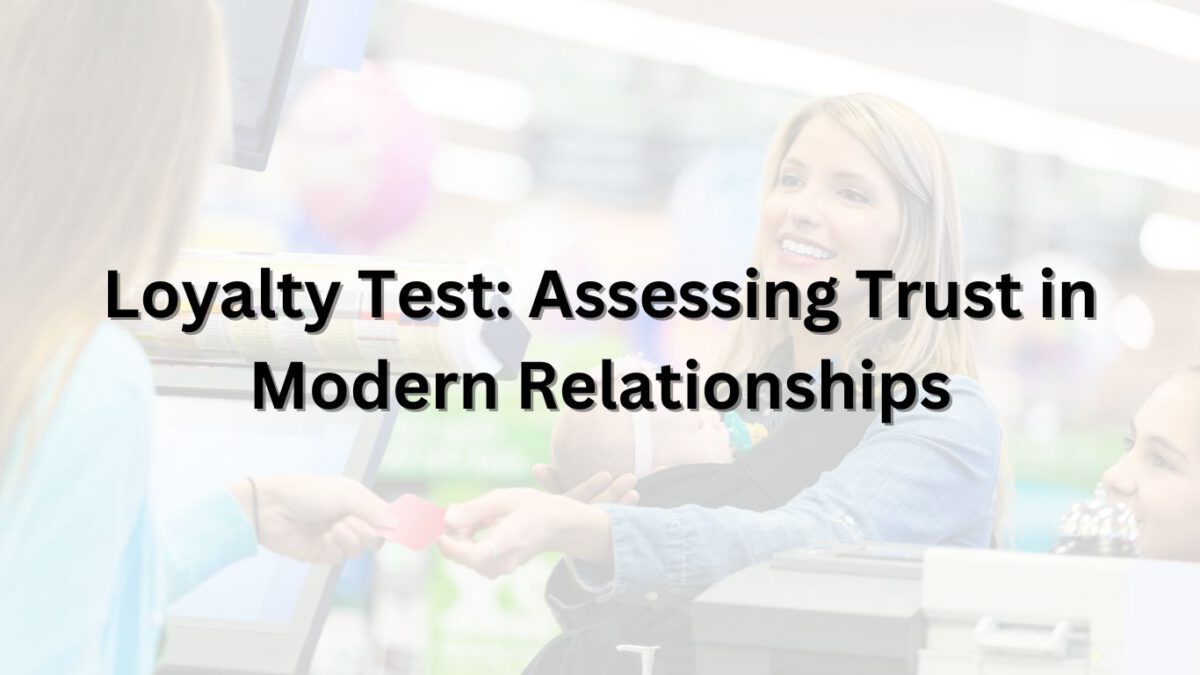A Loyalty Test Investigation is a delicate yet crucial service designed to verify the trustworthiness and loyalty of a partner, employee, or any individual whose behavior or actions are in question. The most common use of this type of investigation is in personal relationships where suspicions about infidelity or betrayal arise. However, loyalty tests are also used in professional settings to ensure that employees or business partners are acting in the best interests of the company, maintaining confidentiality, or adhering to ethical standards.
This form of investigation can be emotionally challenging but necessary when trust issues arise. Whether it’s confirming a partner’s loyalty in a romantic relationship or verifying an employee’s commitment in a corporate environment, a loyalty test can provide clarity and peace of mind.
What is a Loyalty Test Investigation?
A Loyalty Test Investigation involves discreetly observing an individual’s behavior or activities to assess their loyalty, honesty, and commitment. This can be carried out in various ways depending on the situation and the goals of the investigation.
In a personal relationship, a loyalty test typically focuses on determining whether a person is cheating or hiding something from their partner. It could involve surveillance, tracking their activities, or testing their reactions in situations meant to provoke a response.
In a professional setting, a loyalty test might involve checking for integrity or unethical behavior among employees or business partners, ensuring they are not engaged in actions like theft, disloyalty, or leaking confidential information.
Types of Loyalty Tests
1. Personal Relationship Loyalty Tests
In personal relationships, loyalty tests are commonly used to check if a partner is being faithful, honest, or trustworthy. Some of the methods include:
o Surveillance: A private investigator may shadow the individual to track their movements and interactions, ensuring they are not engaging in suspicious or dishonest behavior.
o Infiltration: A common approach is to have a trusted person pretend to be interested in the partner to gauge their response and see if they act unfaithfully.
o Online Investigation: This may involve reviewing social media profiles, messages, or emails to check for signs of infidelity or dishonesty.
2. Employee Loyalty Tests
In a corporate setting, loyalty tests are conducted to ensure that employees are acting in the best interest of the organization. Some examples include:
o Background Checks: Reviewing an employee’s past actions and history to determine if they have been dishonest or engaged in unethical activities.
o Monitoring Behavior: Observing how an employee interacts with company resources, such as proprietary information or financial assets.
o Simulated Ethical Dilemmas: Testing how an employee responds to ethical challenges, like being offered bribes or witnessing unethical behavior.
3. Business Partnership Loyalty Tests
For businesses concerned about their partners’ loyalty, tests may involve:
o Surveillance of Financial Transactions: Monitoring business partner activities, including financial records, to ensure they aren’t secretly engaged in fraud or conflicts of interest.
o Confidentiality Breach Tests: Assessing whether business partners or stakeholders leak proprietary information or collaborate with competitors.
Why Do You Need a Loyalty Test?
1. Peace of Mind in Relationships
A loyalty test can provide the clarity needed when you have doubts or suspicions about a partner’s actions. Whether you’re concerned about infidelity, dishonesty, or betrayal, a loyalty test can help confirm or dispel those concerns, allowing you to make informed decisions about your future.
2. Protecting Your Business Interests
In business, maintaining the loyalty of employees and partners is essential for the success and integrity of the organization. A loyalty test can protect a company from insider threats, fraud, or betrayal that could lead to significant financial or reputational damage.
3. Preventing Emotional Harm
In personal relationships, dealing with doubts about loyalty can be emotionally draining. A loyalty test can put your mind at ease by revealing the truth, allowing you to move forward without the burden of uncertainty.
4. Uncovering Hidden Secrets
Whether it’s in a relationship or a business setting, loyalty tests often expose secrets or behaviors that are hidden from view. These investigations help to unveil the truth, no matter how uncomfortable it may be, ensuring that you are aware of any betrayal or disloyalty.
How Does a Loyalty Test Investigation Work?
1. Initial Consultation
The first step in a loyalty test investigation is discussing your concerns with a private investigator or detective agency. They will listen to your suspicions, understand the context, and provide recommendations on the best course of action.
2. Planning and Preparation
A detailed plan is then created based on the objectives of the test. This could involve choosing the best approach — whether it’s surveillance, infiltration, or background checks. The investigator will also take into account the legal implications of the investigation to ensure all actions are ethical and lawful.
3. Conducting the Investigation
The investigation is conducted discreetly, with the goal of obtaining irrefutable evidence regarding the individual’s loyalty. Depending on the situation, the investigator may follow the subject, monitor digital activity, or even arrange scenarios that will test the subject’s reaction.
4. Evidence Gathering
During the investigation, the private detective will collect tangible evidence such as photos, videos, digital communications, or witness statements. This evidence will be used to confirm or deny the suspicions.
5. Reporting the Findings
Once the investigation is complete, the findings are compiled into a detailed report, which may include visual proof, a timeline of events, and summaries of the subject’s behavior. The report will be presented to the client, who can then decide how to proceed with the information.
Benefits of a Loyalty Test Investigation
1. Objective Evidence
One of the key advantages of a loyalty test is that it provides concrete, unbiased evidence. Whether it’s a video showing a partner being unfaithful or proof of a business partner committing fraud, the evidence gathered during the investigation is invaluable.
2. Restoring Trust
In relationships, a loyalty test can help restore trust or end doubts. Knowing the truth allows you to either rebuild the relationship with full transparency or move on without being weighed down by uncertainty.
3. Prevention of Future Harm
Loyalty tests can prevent future problems by identifying disloyal or unethical behavior early on. For businesses, detecting a lack of loyalty in employees or partners can protect against financial loss, fraud, or damage to reputation.
Challenges of Loyalty Tests
1. Emotional Impact
For personal relationships, the outcome of a loyalty test can be emotionally devastating. It’s important to consider whether you are prepared to handle the truth before proceeding with such an investigation.
2. Legal and Ethical Boundaries
Loyalty tests must always be conducted within the law. Private investigators are trained to operate in ways that respect privacy laws, and all activities must adhere to ethical standards.
3. Risk of Misinterpretation
Sometimes, the evidence obtained in a loyalty test may be open to interpretation, and there may be misunderstandings or misjudgments about the findings. It’s essential to approach the results with a clear understanding of the context.
Conclusion
A Loyalty Test Investigation is a powerful tool for uncovering the truth, whether in a personal or professional setting. It helps reveal hidden behaviors and provides clarity in situations where trust is in question. While it can be emotionally challenging, it offers invaluable insights that can guide you in making informed decisions. Whether you’re concerned about a partner’s faithfulness, an employee’s integrity, or the loyalty of a business partner, a professional loyalty test can give you the answers you need to move forward with confidence.

